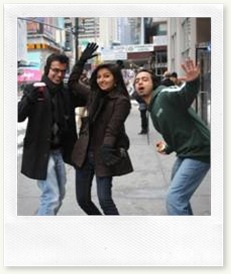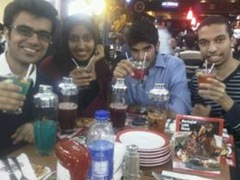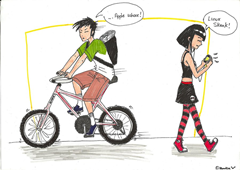The Third Culture 1: Musings of a Global Nomad
I would first like to apologize to those few who read my blog regularly for the lack of updates. I’ve been busy catching up with this semester’s work as I had joined college a few days later due to my lost passport. I hope to write regularly again.
The fact that that some of my blog readers have called me an “American Puppet” who posses a very western view of the world didn’t help either. Those who possess such a view have certainly not understood the purpose of my blog, as it attempts to find common patterns of humanity regardless of any political ideology. Sadly, ideas such as human rights appear western to us.

Speaking of patterns, I am taking an introductory course in sociology this semester. As my final project, I am going to study the lives of Third Culture Kids (TCK), particularly the common patterns of seclusion, indecision and delayed adolescence. This is something personal to me, because being a TCK myself, I have seen how frustrating it can be trying to fit in to one particular culture, and how your varied interests lead to confusion.
The term “Third Culture Kid” (TCK) is defined as an individual who, “as a child, has spent a significant period of time in one or more culture(s) other than his or her own, thus integrating elements of those cultures and their own birth culture, into a third culture.” (Eakin). When I first started the study, I asked Maheen (my sister) about how she felt her life was different being a TCK, especially when we first moved from Germany. The first thing that she said was that she felt she was more childish than our cousins and other children our age. I remember us being called “Germany kay Janwaar” (The Animals from Germany) because were considered more immature and hyperactive than other kids our age. Apparently, this trend is prevalent across most most TCK’s because they tend to be restless individuals whose varied exposure and mobility leads them to crave for excitement in the most childish way.
Having lived more than half of my life outside Pakistan, I still identify with the most and try to hold on to the Pakistani culture. Yet, I don’t believe I truly fit in anywhere. The only people I can identify with is other TCK’s and thank God so many of the students in Education City are like me. In the time I have lived in Pakistan, I’ve barely made any friends but I continue to try. Over my three years in Education City, yesterday was the first time I attended one of the all-Pakistani Eid events and had a blast, thanks to the generous hospitality of Basit & Navid’s parents. However, I continue to be uncomfortable in an environment of a single culture, but I think I am getting there!
I’ve tried very hard to fit in, but I guess its okay as long as you have other TCK’s like you. TCK’s aren’t better or worse than non-TCK’s, we’re just different.
I am still not sure how much my introversion plays a part in this, but I can definitely relate to the stories of other TCK’s I read about online.
I will be doing extensive research on this and will continue to report my findings.
Bibliography:
Eakin, Kay Branaman. “ACCORDING TO MY PASSPORT, I’M COMING HOME.” US Department of State Document Archives (2004).
 student, I realized that I was an anthropologist in my own way. Jessika was a courageous person; she came to Rwanda all alone to study the effect of ICT in learning and the role the government can play in it. What makes her even more courageous was that she was completely uncertain of what the future would hold; she had not received a visa that gave her the license to do her study, she knew barely anyone in the country and more importantly, she was pursuing a career that did not guarantee her any kind of job security. Yet, she was visibly happy with what she was doing, and was a tremendous support to all of us.
student, I realized that I was an anthropologist in my own way. Jessika was a courageous person; she came to Rwanda all alone to study the effect of ICT in learning and the role the government can play in it. What makes her even more courageous was that she was completely uncertain of what the future would hold; she had not received a visa that gave her the license to do her study, she knew barely anyone in the country and more importantly, she was pursuing a career that did not guarantee her any kind of job security. Yet, she was visibly happy with what she was doing, and was a tremendous support to all of us.






